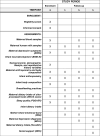Plasma and breast milk adipokines in women across the first year postpartum and their association with maternal depressive symptoms and infant neurodevelopment: Protocol for the APPLE prospective cohort study
- PMID: 39453947
- PMCID: PMC11508165
- DOI: 10.1371/journal.pone.0310847
Plasma and breast milk adipokines in women across the first year postpartum and their association with maternal depressive symptoms and infant neurodevelopment: Protocol for the APPLE prospective cohort study
Abstract
Introduction: Adiponectin and leptin play important roles in the central nervous system. During the postpartum period, there is a need for a better understanding of the relationship between these cytokines and the neurological development of the infant, as well as their influence on preventing maternal depressive symptoms.
Objectives: To assess the correlation between adiponectin and leptin in maternal plasma and breast milk and their association with: infant neurodevelopment at 6 and 12 months of age; and maternal mental health over the first year postpartum.
Methods: Prospective cohort study with four follow-up. Mothers and their newborns are recruited within the first 15 days postpartum (baseline). Follow-up visits occur at 2, 6, and 12 months postpartum. Visits include blood and breast milk collection, application of the Edinburgh Postnatal Depression Scale and Beck Depression Inventory to assess maternal mental health, application of the Bayley-III scale for infant developmental assessment, maternal and infant anthropometry and body composition, evaluation of reproductive history, mother-infant bonding, breastfeeding, consumption of ultra-processed foods, sleep quality, and socio-economic and demographic data.
Results: The research received funds in August 2022, and participant recruitment began in September 2022. The sample size will consist of 95 mother-child pairs. As of September 2023, 68 participants have been recruited.
Conclusion: The project will provide insights into the association between adiponectin and leptin with postpartum depression and infant neurodevelopment, ultimately promoting improved care and quality of life for these groups. Additionally, it will provide data on the type of delivery, infant physical growth, maternal and infant body composition changes, sleep quality, consumption of ultra-processed foods, and maternal metabolic health, including vitamin D metabolites, oxidized polyunsaturated fatty acid metabolites, phospholipid species and triacylglycerols, which are of significant relevance to public health and, when interconnected, may yield important results and contribute to the existing literature.
Trial registration: Name of the registry: Brazilian Clinical Trials Registry (ReBec). Registration number: RBR-9hcby8c.
Copyright: © 2024 Rebelo et al. This is an open access article distributed under the terms of the Creative Commons Attribution License, which permits unrestricted use, distribution, and reproduction in any medium, provided the original author and source are credited.
Conflict of interest statement
The authors have declared that no competing interests exist.
Figures
References
-
- Codoñer-Franch P, Hernández-Aguilar MT, Navarro-Ruiz A, López-Jaén AB, Borja-Herrero C, Valls-Bellés V. Diet supplementation during early lactation with non-alcoholic beer increases the antioxidant properties of breastmilk and decreases the oxidative damage in breastfeeding mothers. Breastfeed Med. 2013;8: 164–169. doi: 10.1089/bfm.2012.0059 - DOI - PubMed
MeSH terms
Substances
LinkOut - more resources
Full Text Sources
Medical
Research Materials


